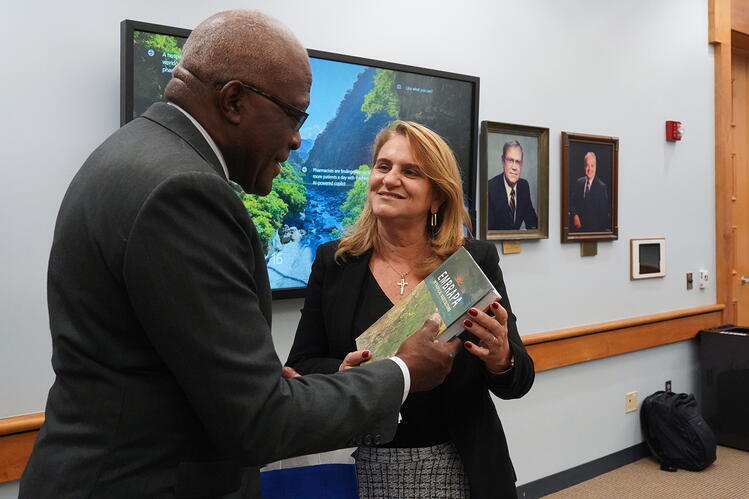ACES new collaborations with Brazil’s Embrapa aim to counter climate change and drive the bioeconomy

Faculty from the College of Agricultural, Consumer and Environmental Sciences are teaming up with the Brazilian Agricultural Research Corporation (Embrapa) on groundbreaking projects to tackle climate change and drive the future of the bioeconomy.
The three selected projects from a competitive open call for proposals are:
“Climate-Smart Computer Vision System for Real-Time Cattle Monitoring and Decision Support in Brazil–U.S. Grazing Systems” Isabella Condotta (Animal Sciences) and Luciano Basto Lopes and Diego Batista Xavier (Embrapa’s Agrosilvopastoral Research Center in Sinop-MT) – funded by ACES.
“Waste to Wealth: Transforming Agricultural Waste into Energy Solutions for the Circular Economy,” Yi-Cheng Wang (Food Science and Human Nutrition) and Washington Luiz Esteves Magalhães (Embrapa) – funded by ACES and Embrapa.
“Characterization of Greenhouse Gas Emissions from Intensified Agricultural Production Systems to Support Public Policies: Use of Simulation Modeling Integrated with Artificial Intelligence and Geoprocessing Techniques” Bruno José Rodrigues Alves (Embrapa Agrobiologia) and Kaiyu Guan (Natural Resources and Environmental Sciences) – funded by Embrapa.
“These three new projects continue the rich history of collaboration between ACES and Illinois with Brazil to build a global community united by a shared commitment to positively impact the world,” said Mary Arends-Kuenning, Associate Dean for International Programs in ACES.
The Office of International Programs with the support of the Office of Research solicited proposals for joint research projects with researchers from Embrapa. The projects are funded by the College of ACES Office of Research and Embrapa and are to be completed within two years. Embrapa was established in 1973 by the Brazilian Ministry of Agriculture, Livestock and Food Supply (MAPA) to develop the technological foundation for a genuinely tropical model of agriculture and farming. As a public research, development, and innovation company, Embrapa has been tasked with providing Brazil with food security and a leading position in the international market for food, fiber, and energy. An Embrapa researcher
won the 2025 World Food Prize.
More about the three new projects
Condotta’s cattle monitoring project builds on the 3DBov software, initially developed by Embrapa and the University of Illinois, to develop and validate a climate-smart computer vision system to enhance cattle monitoring and decision-making in grazing systems across Brazil and the United States. Running field trials in both countries will evaluate the system’s robustness across climates, breeds, and management practices.
“We will expand 3DBov’s capabilities to include automated modules for body condition scoring, facial recognition for animal identification, and accurate weight estimation under real-world, pasture-based conditions. These tools will then be integrated into a scalable, user-friendly platform designed to support adaptive management amid increased climate variability. Ultimately the open-source platform will serve to enhance the adaptive capacity of livestock systems under environmental stress, reduce greenhouse gas (GHG) emissions through precision management, and improve productivity by minimizing animal handling and enabling early intervention,” Condotta explained.
Wang’s project will work towards upcycling agricultural waste into functional materials for sustainable energy harvesting.
“We will engineer naturally porous materials derived from agricultural waste into high-performance triboelectric devices capable of converting abundant, otherwise-wasted mechanical energy—e.g., from human motion and vehicular vibrations—into electricity,” he said.
Alves' and Guan’s project will use two pilot regions to identify and validate effective sustainable practices and quantify their impacts on GHG emissions. The lessons learned from the pilot regions will lay the groundwork for broader application across diverse landscapes, ultimately contributing to evidence-based strategies that promote environmental sustainability, climate resilience, and food security.
“The project represents the strategic agendas of both Embrapa and the University of Illinois by addressing sustainable intensification, emissions mitigation, use of digital tools, and support for public policies,” Guan said.